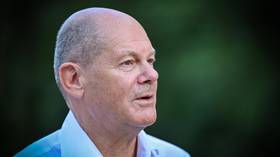113 German MPs call for ban on major opposition party
An initiative group within the Bundestag claims that Alternative for Germany (AfD) is a “Nazi party”
A large cross-faction initiative group in the Bundestag has submitted a motion calling for a ban on Alternative for Germany (AfD), a major opposition party with more than 80 seats in the national legislature. The motion initiators claimed that the right-wing party was going against what they called the “central basic principles” of the democratic order and posed a danger to the state, according to the local media.
Established in 2013 as an Euroskeptic party, the AfD has become known for its anti-immigration rhetoric amid the refugee crisis of 2015. Its former and standing members were also repeatedly involved in various controversies over statements related to Germany’s Nazi past.
Following the start of the conflict between Moscow and Kiev, the party also criticized Berlin’s aid to Ukraine and called for the restoration of economic ties with Russia, which were effectively severed as a result of Berlin’s sanctions against Moscow.
AfD Co-Chair Tino Chrupalla particularly rejected the continued costly support for Ukraine provided by Chancellor Olaf Scholz’s government, and urged the return of Russian natural gas to support the struggling German economy.
Other major German parties have mostly shunned AfD, accusing it of ties to right-wing extremists and refusing to enter any political coalitions with its members. The party has still enjoyed growing support from the German public over the years, which was particularly strong in the eastern German states.
In September, AfD won regional parliamentary elections in the state of Thuringia and came in second in two other eastern states – Brandenburg and Saxony.
“We must subject this powerful right-wing extremist party to the review by the Federal Constitutional Court,” the initiative group’s leader, Marco Wanderwitz, told a German TAZ newspaper on Wednesday. “This is about nothing less than our free democracy,” said the MP representing the conservative Christian Democratic Union (CDU).
The motion was mostly supported by the Greens, which accounted for roughly half of the 113-strong group, 31 of Scholz’s Social Democratic Party MPs, and 18 out of 28 Left Party lawmakers. Only six other CDU members joined Wanderwitz in this initiative, though.
The motion submitted by the MPs accuses AfD of questioning the human dignity of migrants and the LGBTQ+ community and trivializing Nazi crimes as well as serving as an “extended arm of authoritarian foreign regimes.”
One Left Party MP, Martina Renner, who is among the co-initiators of the motion, openly called AfD a “Nazi Party,” adding that “more and more colleagues see it as their responsibility to protect democracy” from a danger supposedly posed by AfD.
The party itself has not yet commented on the developments. The German domestic security service – the BfV – was expected to present a report on the AfD, where it could potentially upgrade the party’s status to a “proven right-wing extremist” organization. The report, however, was postponed due to the potential early parliamentary elections that could be held in February.
The BfV already declared it a “suspected” extremist group in 2021. Its regional branches were also designated “right-wing extremist” groups by authorities in three German states, including Saxony.
The motion submitted on Wednesday would need a simple majority in the 733-strong parliament for the Constitutional Court to launch a case against AfD – a first step towards its potential ban.
According to the German media, the future of the initiative is unclear as most CDU MPs, including the party’s leader, Friedrich Merz, as well as the Free Democrats and Sahra Wagenknect’s Alliance (BSW) oppose it. The CDU has the biggest opposition faction in the legislature, with over 150 MPs; the Free Democrats hold 90 seats and the BSW has 10.
You can share this story on social media:









Comments are closed.